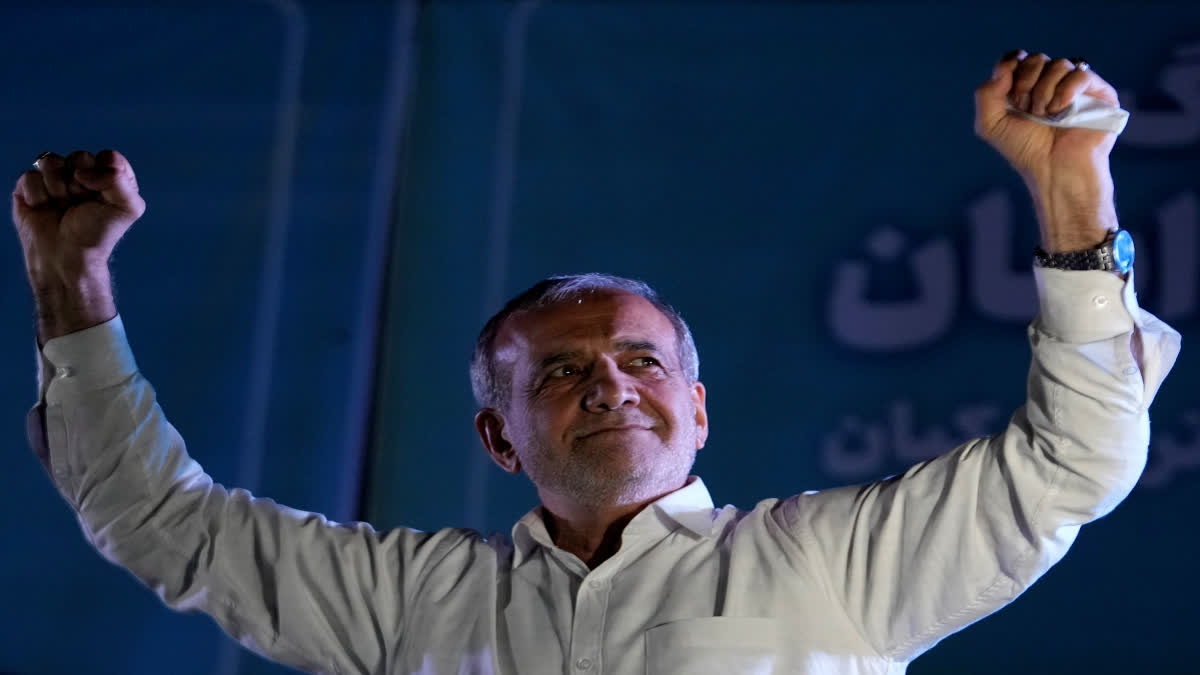The much-awaited election to the post of President of Iran finally delivered the results on July 6 after a run-off for the second round. At the age of 69, Masoud Pezeshkian, known for his reformist views, defeated his conservative opponent Saeed Jalili by 53.7% to 44.3% (roughly by a margin of three million votes - about 10% of the total votes cast) to become the oldest president of the country.
A specialist in heart surgery by profession, Pezeshkian had been a member of the Iranian parliament for five terms, governor of two counties and health minister of Iran.
Influenced by the former reformist president Hassan Rouhani as he was, the presidency eluded Pezeshkian twice in the past-once in 2013 when he had to withdraw his candidature and then in 2021, when his name was rejected by the guardian Council.
During the recent election campaign, he declared that "implementation of religious faith with the use of force was scientifically impossible" inviting criticism from his hardline opponents.
It is to be noted that all other major candidates, including the Speaker of the Parliament, withdrew in favour of Saeed Jalili to make the contest clearly reform versus tradition.
Pezeshkian, an opponent of police patrol on the implementation of hijab, had also promised to ease internet restrictions, induct more women and tribals in his Cabinet and, above all, work for the revival of JCPOA (Joint Comprehensive Plan of Action) in order to ease the sanctions on his country over its nuclear ambitions.
He boldly declared his intention to "get Iran out of its isolation" by having "constructive relations with the West." In an election debate with his opponent, the president-elect claimed that the only way to check soaring inflation (currently around 40%) was to ensure a foreign investment of more than $200 billion which could not be done without "mending relations with the World". Clearly, he has set his eyes on revisiting bilateral relations beyond China, Russia and a handful of traditional allies.
Within Iran, the reactions to Pezeshkian’s victory have been mixed. While for some, his ascendence to power has brought hope for long-due reforms, especially in the aftermath of the country-wide anti-hijab protests in 2022, some others feel that there is hardly any improvement he can bring about.
According to noted Iranian political commentator Mossadegh Mossadeghpoor, "people are currently hopeful that he can make some good changes and resolve some issues." Qualifying this hope itself makes it evident that no drastic changes can be expected in domestic policies. Given the constitutional provisions and the vast power of the Rahbar (supreme leader) Ayatollah Ali Khamenei, some social changes like easing the internet ban, increasing representation of women and tribals in the cabinet can be expected but the more contentious issues like hijab and the high-headedness of police are not likely to be touched by him.
It must not be forgotten that the President’s hands are tied as the supreme leader, himself conservative in his approach, has the sole authority to appoint heads of the Armed Forces, intelligence, police, judiciary, radio and TV and the members of Guardian Council. Moreover, in the new Parliament, elected in March this year, the hardlines are in a majority which will make it more difficult for Pezeshkian to sail through the troubled waters.
However, in view of the catastrophic effects of the sanctions imposed by the Western countries and financial institutions on Iran, Khamenei may give the new president a small leeway to negotiate for the revival of the JCPOA. But, even if Khamenei allows Pezeshkian to extend an olive branch to the US, the outcome of such an effort does not prima facie seem to bring any tangible result as the world knows that Iran has achieved around 90% of enrichment of uranium, enough to produce an atom bomb thus defeating the very purpose of JCPOA.
The Joe Biden administration, already reeling under the pressure of impending presidential elections late this year, will certainly not like to take a chance of entertaining Iran unless Biden is sure to get some tangible result in the form of De’tente in the Middle East which can be encashed in the elections as a 'feat' by Biden.
While many countries including China, Russia, Saudi Arabia, UAE, and Venezuela have hailed this election as a victory for multi-polarity and committed to working for regional peace, reactions from the Western world are yet awaited. Some countries like Iraq have very cautiously reacted to this election limiting only to congratulatory messages.
No reaction has come so far from other major countries in the Middle East like Egypt and Jordan. However, the US Foreign Office termed the election "not free or fair" and declared that "it would have no significant impact on our approach to Iran."
Prime Minister Narendra Modi was also quick to congratulate the President-elect and looked forward to "working closely to further strengthen our warm and long-standing bilateral relationship for the benefit of our peoples and the region."
How is Pezeshkian’s election going to affect India-Iran relations? We already have steadily good relations with Iran except for some occasional misunderstandings on the management of Chabahar port which have been sorted out.
India has, of late, again shown interest in participating in the Chabahar-Zahedan Rail Project. However, if at all the new Iranian President succeeds in taking Iran out of isolation by reviving the JCPOA, it will result in easing out of the sanction which, in turn, will re-open for us the import of crude from Iran. It is to be noted that before the Western sanctions on Iran, it had been a major, and sometimes even the largest, source of crude for India.
It will also pave the way to invest in developing more infrastructure in Iran which is crucial for our trade with Afghanistan and further to central Asian countries. Moreover, it will give us an opportunity to revive the Iran-Pakistan-India gas Pipeline and convince Iran to increase pressure on Pakistan to complete its part of construction (781 km) out of a total of 2755 km long project. If we rejoin this project and if Iran makes Pakistan fulfil its commitment, our energy constraints will be significantly eased.
But in the end, it all depends on how far Iran’s new administration is willing to concede to the West and how the latter reacts to the reproachment by Iran. The role and capability of the Kingdom of Saudi Arabia to broker an understanding between its new-found friend Iran and the old ally USA will also be placed on anvil.
(Disclaimer: The opinions expressed in this article are those of the writer. The facts and opinions expressed here do not reflect the views of ETV Bharat)




